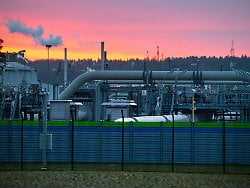Scholz and Nord Stream 2
Ischinger denounces credibility gap
02/12/2022, 10:48 am
During his inaugural visit to Washington, Chancellor Scholz refused to make a clear statement about Nord Stream 2 – which posed a problem for the head of the Munich Security Conference. The natural gas business is putting the US President “in difficult waters,” he warns.
In view of the increased tensions with Russia in the Ukraine crisis, the head of the Munich Security Conference, Wolfgang Ischinger, has criticized the German government’s handling of Nord Stream 2. “If you had asked me, I would have advised Washington to say clearly: In the event of a Russian attack, the project will be over – just like the Russian oil supplies to the USA,” Ischinger told the “Welt am Sonntag”. “This information would have helped us to close this German credibility gap even better,” emphasized the head of the Munich Security Conference.
Ischinger warned of the heavy burden that Nord Stream poses to German-American relations. The natural gas business is bringing the US President “into difficult waters”. For his friendliness to Germany, he received opposition from the Republicans. “With a view to the USA, we have to seriously consider the possibility that after the next presidential election we are threatened with a new Donald Trump as president,” Ischinger continued.
The Europeans have an existential interest in the USA remaining a reliable transatlantic partner. “So we shouldn’t make it more difficult for Biden or his successor to win the election.” Germany has “relatively large goodwill capital with Joe Biden, he is a transatlanticist by conviction. But this capital is not inexhaustible.”
Scholz pushes around
During his inaugural visit to Washington, Chancellor Olaf Scholz repeatedly avoided the question of whether a Russian attack on Ukraine would mean the end of the controversial North Sea pipeline Nord Stream 2. The SPD politician had only emphasized that all means of pressure were on the table and that the West would act together. In the past, the SPD politician had repeatedly characterized Nord Stream 2 as a private-sector project whose commissioning would not be decided politically.
Economics Minister Robert Habeck, on the other hand, clearly asserted on Friday that the aggravated situation in geopolitics will not remain without consequences for the approval of the Nord Stream 2 gas pipeline. “In these times, energy policy is always geopolitics,” said the Green politician on Friday in Warsaw. Habeck said he was counting on tough economic sanctions against Russia should the government in Moscow allow the Ukraine conflict to escalate. “We’re talking about war in Europe here.”
